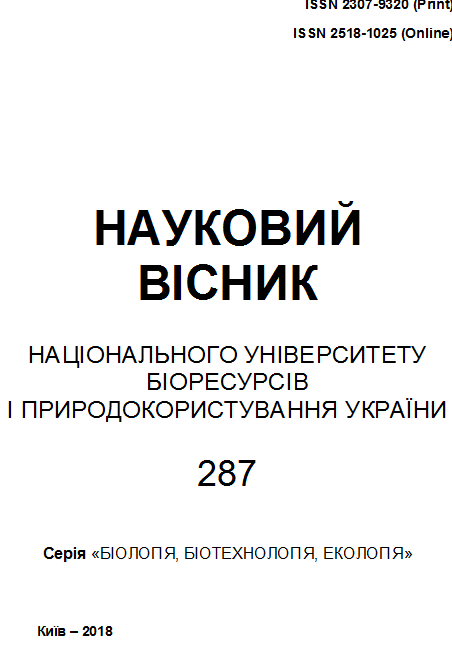THE ESTIMATION OF THE IMPACT OF SOLID HOUSEHOLD WASTE ON THE STATE OF SURFACE WATERS IN THE AREA OF KHERSON
DOI:
https://doi.org/10.31548/biologiya2018.287.014Abstract
The study looks at the problem of solid household waste generation in urban ecosystems. The lack of registration of waste and the level of its danger led to developing the indicators of sustainable development in the area of waste management. The system of indicators of sustainable development of Kherson consisted of the basic indexes and the aggregate index of waste management. The most informative in performing the estimation of the urban territory were the indexes of waste generation of the 1st–3rd levels of danger and solid household waste generation per capita which were integrated by the formula of the geometric mean into the aggregate index of waste management. An increase in the numeric parameters of the basic indexes caused a worse situation in the area of waste management. There is a distinct tendency for an increase in their annual volumes. While calculating, a satisfactory condition in the area of waste management was established: the aggregate index Ia made 0.58. It was established that in the general structure of solid household waste, food waste made about 45 %. The generated filtrates have only two natural ways for migration: filtration into ground waters or entering the ravine and the river Virovchyna and the Dnipro river. As a result, there is progressive pollution of Kherson surface waters by biogenic and toxic elements. Therefore in order to determine the condition in the area of waste management, the scale of the indicators of sustainable development was developed to take measures aimed at minimizing the number of pollutants entering water bodies.
References
Holets, N., Malovanyi, M., Malyk, Yu.(2013). Rozrakhunok klasu nebezpeky filtratu Hrybovytskoho polihonu tverdykh pobutovykh vidkhodiv [Calculation of the hazard class of the Gribovystskoho filtrate solid household waste landfill]. Bulletin of LDU BZD, 7, 219-224.
Malovanyi, M. S., Holodovska, O. Ya., Pasternak, M. I. (2011). Tverdi pobutovi vidkhody m. Lvova ta yikh vplyv na dovkillia [Solid municipal waste in Lviv and its impact on the environment]. Chemistry, technology of substances and their application, 7, 250-252.
Konыhyn, A. A. (2011). Kompleksnaia tekhnolohyia ochystky fyltrata polyhonov zakhoronenyia tverdыkh bыtovыkh otkhodov [Complex technology offiltrate purification of land fills for disposal of solid household waste]. Building sciences, 4, 105-109.
Petruk, V. G., VasilkIvskiy, I. V., Ischenko, V. A., Petruk, R. V. (2013). Upravlinnya ta povodzhennya z vidhodami. Poligoni tverdih pobutovih vidhodiv [Management and waste management. Polygons of solid household waste]. Vinnitsa: VNTU, 139.
Savulyak, V. I., Berezyuk, O. V. (2006). Tehnichne zabezpechennya, zbirannya, perevezennya ta pidgotovki do pererobki tverdih pobutovih vidhodiv [Technical support, collection, transportation and preparation for the processing of solid household waste]. Vinnytsya: Universum-Vinnitsa, 218.
Кlymenko, M. O., Pylypenko, Yu. V., Pryshchepa, A. M., Vozniuk, N. M. (2010). Monitorynh dovkillia [Environmental monitoring]. Kherson: Oldi-plus, 208 .
Brezhytska, O. A. (2010). Otsiniuvannia stanu selitebnykh terytorii za pokaznykamy staloho rozvytku (na prykladi mista Dubno Rivnenskoi oblasti) [Assessment of the state and dynamics of atmospheric air pollution of the urbose ecosystem (for example, the city of Dubno)]. Zhytomyr: National Agroecological University. Sumy, 20.
Rehionalna dopovid pro stan navkolyshnoho pryrodnoho seredovyshcha v Khersonskoi oblasti za 2016. (2017). [Regional report on the state of the environment in Kherson oblast for 2016] Kherson, 290.
Downloads
Published
Issue
Section
License
Relationship between right holders and users shall be governed by the terms of the license Creative Commons Attribution – non-commercial – Distribution On Same Conditions 4.0 international (CC BY-NC-SA 4.0):https://creativecommons.org/licenses/by-nc-sa/4.0/deed.uk
Authors who publish with this journal agree to the following terms:
- Authors retain copyright and grant the journal right of first publication with the work simultaneously licensed under a Creative Commons Attribution License that allows others to share the work with an acknowledgement of the work's authorship and initial publication in this journal.
- Authors are able to enter into separate, additional contractual arrangements for the non-exclusive distribution of the journal's published version of the work (e.g., post it to an institutional repository or publish it in a book), with an acknowledgement of its initial publication in this journal.
- Authors are permitted and encouraged to post their work online (e.g., in institutional repositories or on their website) prior to and during the submission process, as it can lead to productive exchanges, as well as earlier and greater citation of published work (See The Effect of Open Access).

